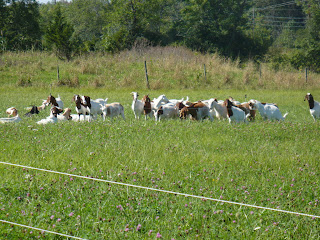Those are the immortal words of Max Elmore as he stated them in "THE MAX STRATEGY" by Dale Dauten. What you may ask, do they have to do with this blog? In a nutshell, everything. Let me explain.
Raising goats, and farming for that matter, have always seemed to be a fairly simple proposition. If you do this you should likely get that result. Of course the weather and various plagues can interfere with attaining your desired results, but for the most part you reap what you sow. The challenge here is that for millenia, the precedent to sowing was plowing. We as farmers became masters of plowing, whether it was behind an ox or horse, or one of the modern versions of the horse and you pulled your 16 bottom plow around with a 450 horsepower Case IH tractor. The end result was always the same, the soil on the top was buried under the soil that was on the bottom. It makes perfect sense to do this, doesn't it? After I sat through a presentation by Ray Archuleta of the NRCS last winter at the Annual Winter Green-Up Conference, I couldn't go out and put a plow to anything. He likened plowing to a volcanic eruption, tsunami, earthquake and tornado all at once to your soil microbes. It is your microbes and earthworms that indeed create that most precious of all resources, topsoil. Plowing literally destroys the topsoil and with it your future ability to grow crops. What is a caring farmer to do?
The answer to that dilemma is of course No-Till! Problem is that I don't own a single piece of equipment that was designed to plant anything right into the sod. And beyond that, how do you grow a crop like corn without eliminating all the competition? Spraying herbicides to kill everything on the field is NOT an option for me. This was the what I faced as I went through the summer and needed to improve some pasture that will be needed by the goats as we grow into the future. Enter Max and his dictum that "Experiments Never Fail".
Now, if you read my previous blog you can see me out on an obviously tilled field planting Triticale and Oats. That field has a very noxious weed on it named Nutsedge. Nutsedge is very persistent and difficult to control. That field was gone over with a set of discs to weaken the plants before planting. This field is a multi-year project to rejuvenate the plant species growing there. The field below that one has much less nutsedge, but could use an infusion of better varieties of pasture plants to make it more productive. The challenge came in that we did not want to destroy what was already there. The plan to renovate now became an experiment, and as we all know, "Experiments Never Fail"!
The goats even got a chance to help with this plan. The doe herd was put on this field and grazed across it in strips to eat it down as hard as they could. They did a great job at doing what they do best, eating. As soon as they had finished I went to work and "No-Tilled" some Creekside forage mix from King's Agriseeds right onto the existing sod. The key was the timing. I planted as soon as they were calling for several days of rain and steady showers. That should get the seed settled right down to the soil and give it enough moisture to germinate and start growing. The challenge here was that I have an old MF 33 grain drill that was not designed to plant into sod, but rather into a well prepared seedbed. The experiment is to see if by using the goats and timing the planting before a rain the new seeds will grow and add to the quality of the pasture. If that doesn't happen, at least we will know what not to do in the future. Experimenting with what we have and $300 worth of seed sure beats going out and plunking down $15,000 for a new "No-Till" drill that is specifically designed and built to plant crops right into the heaviest of sods.
So for now, all we have to do is wait and see what happens, and in the meantime spread a little compost on the fields to feed all those microbes and worms we have working for us out there. I hope they appreciate my willingness to give them a good home in exchange for improving the quality of the topsoil here at Sunny Acres. After all, it is that thin veil of living soil that feeds the world. We will do our best to preserve that for the future, even if it means thinking outside of the box on current wisdom and practice to do something different. At least we know for sure that no matter what, "Experiments Never Fail!".


No comments:
Post a Comment